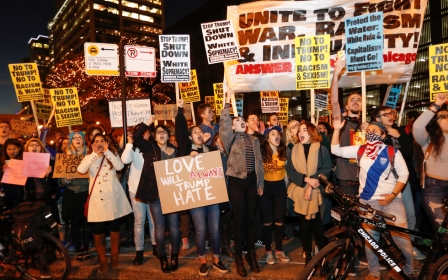US supreme court reviews long-term detention of immigrants
In a review that could affect Donald Trump's campaign promises on immigration, the US Supreme Court on Wednesday heard arguments about whether authorities have the right to force thousands of legal immigrants to endure months or even years of detention without a hearing.
The case concerns a class action lawsuit filed by Alejandro Rodriguez and several other immigrants, supported by the American Civil Liberties Union (ACLU), a leading civil rights group.
Rodriguez arrived from Mexico as a child, attained legal permanent resident status and worked as a dental assistant.
After he was convicted for driving a stolen car and arrested for drug possession, the authorities sought to deport him.
He spent three years behind bars before ultimately prevailing in his fight to remain in the country.
Millions of legal immigrants like him are under threat of being deported even for minor offences - or detained indefinitely if they contest expulsion orders.
The issue has taken on special significance following the presidential election of Donald Trump, who has vowed to crack down on undocumented immigration and ramp up deportations when he takes office in January.
Another category of immigrants under Supreme Court review on Wednesday are those who have sought asylum in the United States, claiming fear of prosecution in their home countries.
The example of Ahilan Nadarajah is telling.
Repeatedly tortured as a member of an ethnic minority in his homeland Sri Lanka, he sought asylum in the United States in 2001.
The authorities detained him, and he remained behind bars for four years and five months as one release request after another was rejected. He eventually received American citizenship.
Flight risk?
"What matters about this case is that you've got people who are fighting their deportation, who are being locked up without bond hearings," Judy Rabinovitz, a member of the ACLU legal team, told AFP.
"Many of them have strong challenges to removal and if they had a bond hearing they wouldn't be found to be a danger of flight risk."
The eight justices currently on the nation's highest court appeared receptive to the ACLU's arguments, criticising the excessive lengths of detention imposed on immigrants.
But they expressed doubts about an automatic introduction of a possible bond hearing after six months of detention.
The government's representative defended the application of the law as it stands.
"Congress provided extensive, substantive and procedural protections for aliens whom the government wishes to remove," acting Solicitor General Ian Gershengorn argued.
"But at the same time, [it] addressed the real concerns about recidivism and flight risk by providing for mandatory detention during removal proceedings for certain categories of criminal aliens and aliens arriving at our shores."
With cases averaging a reported 13 months, and conditions in detention centres facing criticism, the authorities have been under pressure to find a solution.
"Someone has to look at the detention and decide, is this a detention which remains reasonable?" ACLU lawyer Ahilan Arulanantham said.
Detention means prison
Prolonged detention is often indistinguishable from penitentiary time: immigrants are forced to wear prison garb, they can be placed in handcuffs and are subjected to standard prison surveillance.
They can even be placed in solitary confinement.
Family visits are often conducted through glass panes or by video.
"One of my clients [a detained immigrant], her kids came to visit her and she was not allowed to touch them, no contact," Rabinovitz said.
Trump took a hard line against immigrants during his campaign, pledging to expel millions of undocumented immigrants.
Despite current administrative decrees under President Barack Obama aimed at bringing illegal immigrants out of the shadows, he will leave office having deported more people than any of his predecessors.
At least 2.4 million have been escorted to the border or sent back to their home countries through immigration orders over the past eight years.
Stay informed with MEE's newsletters
Sign up to get the latest alerts, insights and analysis, starting with Turkey Unpacked
Middle East Eye delivers independent and unrivalled coverage and analysis of the Middle East, North Africa and beyond. To learn more about republishing this content and the associated fees, please fill out this form. More about MEE can be found here.




